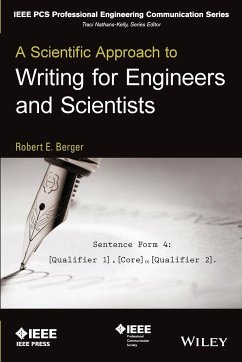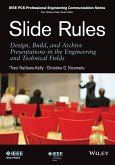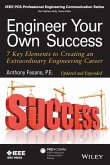A SCIENTIFIC APPROACH TO WRITING
Technical ideas may be solid or even groundbreaking, but if these ideas cannot be clearly communicated, reviewers of technical documents-e.g., proposals for research funding, articles submitted to scientific journals, and business plans to commercialize technology-are likely to reject the argument for advancing these ideas.
The problem is that many engineers and scientists, entirely comfortable with the logic and principles of mathematics and science, treat writing as if it possesses none of these attributes. The absence of a systematic framework for writing often results in sentences that are difficult to follow or arguments that leave reviewers scratching their heads.
This book fixes that problem by presenting a "scientific" approach to writing that mirrors the sensibilities of scientists and engineers, an approach based on an easily-discernable set of principles. Rather than merely stating rules for English grammar and composition, this book explains the reasons behind these rules and shows that good reasons can guide every writing decision.
This resource is also well suited for the growing number of scientists and engineers in the U.S. and elsewhere who speak English as a second language, as well as for anyone else who just wants to be understood.
Hinweis: Dieser Artikel kann nur an eine deutsche Lieferadresse ausgeliefert werden.
Technical ideas may be solid or even groundbreaking, but if these ideas cannot be clearly communicated, reviewers of technical documents-e.g., proposals for research funding, articles submitted to scientific journals, and business plans to commercialize technology-are likely to reject the argument for advancing these ideas.
The problem is that many engineers and scientists, entirely comfortable with the logic and principles of mathematics and science, treat writing as if it possesses none of these attributes. The absence of a systematic framework for writing often results in sentences that are difficult to follow or arguments that leave reviewers scratching their heads.
This book fixes that problem by presenting a "scientific" approach to writing that mirrors the sensibilities of scientists and engineers, an approach based on an easily-discernable set of principles. Rather than merely stating rules for English grammar and composition, this book explains the reasons behind these rules and shows that good reasons can guide every writing decision.
This resource is also well suited for the growing number of scientists and engineers in the U.S. and elsewhere who speak English as a second language, as well as for anyone else who just wants to be understood.
Hinweis: Dieser Artikel kann nur an eine deutsche Lieferadresse ausgeliefert werden.








